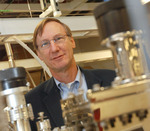Research spending at University of Michigan grows beyond $1 billion
For the second straight year, research spending at the University of Michigan has topped $1 billion, Stephen Forrest, the university’s vice president for research, announced Thursday at the Board of Regents meeting.
In total, research spending grew 12 percent in 2009-10 to $1.14 billion.

Stephen Forrest, University of Michigan
Federal research spending grew 14.7 percent over the previous year, thanks in large part to stimulus funding. Federal research accounted for 65.9 percent of total research spending at the university.
Funding from the National Institutes of Health increased 20.4 percent. NIH contributed more research funds to U-M than any other federal agency.
National Science Foundation research spending at U-M was essentially identical to last year, while Department of Defense research expenditures rose 2.5 percent.
Among non-federal sources of support, funding from public charities increased nearly 20 percent over the previous fiscal year.
Support from foundations grew 4.3 percent.
However, research expenditures from industry grants and contracts fell 9.3 percent compared to the previous year — from $43.3 million to $39.3 million.
"The fact that the total research expenditures rose at such a healthy rate reflects the continued competitiveness of our faculty when it comes to presenting research ideas," Forrest said in a press release handed out at the meeting.
In other action at the meeting, the Regents:
- Approved reappointing Forrest to his role as vice president for research and Dave Munson as the Robert J. Vlasic Dean of Engineering at College of Engineering.
- Approved more than $17 million in construction projects, including the Michigan Memorial Phoenix Laboratory addition and second-floor renovation, a new elevator in South Quad and auxiliary service building renovations for the School of Art and Design.
- Heard a report on the 60 years of the Institute for Social Research.
- Approved a new bachelor of science in bioengineering degree for the University of Michigan-Dearborn and a new education specialist degree for the University of Michigan-Dearborn.
David Jesse covers higher education for AnnArbor.com. He can be reached at davidjesse@annarbor.com or at 734-623-2534.


Comments
MjC
Fri, Sep 17, 2010 : 10:43 a.m.
You've got to do more homework Tom. The problem that occurs when research produces results recommending needed change, is getting people to actually do the changing. Often the results click and recommended change is embraced - and the world becomes a better place. The way parents raise children, the way people should take medications, the way school systems can improve education, the way we use transportation, the way we support men and women in the military, the way we deal with grief, love, loss, and life. Research in these areas have been conducted right here at the University of Michigan and the results are used to educate and improve all of our lives. Don't underestimate the value of the dollars going into research studies. The more we know, the better we become.
theodynus
Fri, Sep 17, 2010 : 10:27 a.m.
Woaaaaaah, more than 50% of research dollars go to overhead? I had no idea. Where'd you find that number so I can go read more about it? As for society's most intractable problems...is it necessary to list every way in which academic research has benefited humankind? Universities have played a major role in almost every world-changing technology and medical treatment of the last century. Private companies simply don't invest in the sort of basic science that needs to happen as a stepping stone to usable gizmos.
E.A. Jacuzzi
Fri, Sep 17, 2010 : 10:25 a.m.
Tom Joad, when performing any research for the government or any grant giving body, you cannot simply use the money for whatever you want. Expenses are itemized and must be justified as they relate to that particular project/grant. You cannot be awarded a $100 million cancer research grant and then build a new hospital wing. If facilities are included in a funding request, the same rules apply...you must build what you said. The large administration is paid for via state funding and tuition dollars along with some other sources.
Tom Joad
Fri, Sep 17, 2010 : 7:50 a.m.
A congratulatory slap on the back for garnering the most money, but have research dollars been translated into solving society's most intractable problems? Look around the campus one can see that the majority of the research dollars are of necessity earmarked to maintain the gigantic infrastructure of research and administration.